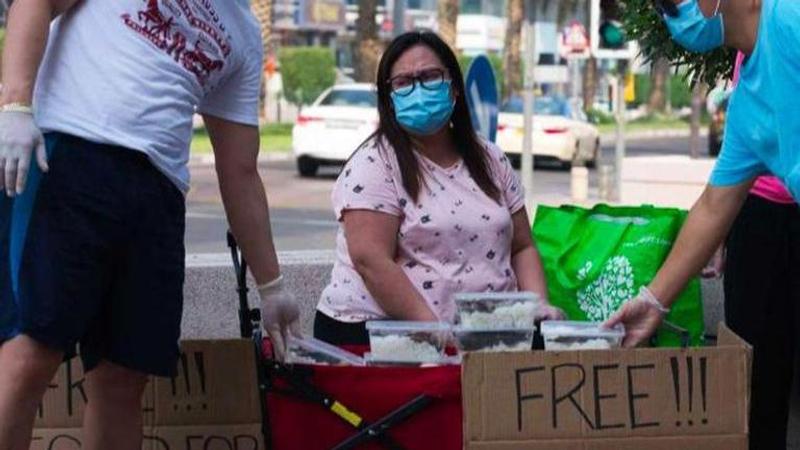Published 12:52 IST, June 10th 2020
Unemployed Filipina feeds other jobless migrants in Dubai
Dela Peña is unemployed. “We’re poor, to be honest,” she said. “But it’s not a reason for me not to help, you know?”

Feby Dela Peña saw her fellow Filipinos standing in line outside her building in Dubai, waiting for free food. And she was stricken what if her family, too, had lost their income amid the COVID-19 outbreak? How would she have fed her three children? Dela Peña is unemployed. “We’re poor, to be honest,” she said. “But it’s not a reason for me not to help, you know?”
So the next day, she pulled out the money that was supposed to feed her family of five for a month. When their 11 housemates got wind of her plan — like most migrant workers in Dubai, the family lives in a shared apartment — those who could chipped in as well.
She was able to buy about 500 dirhams, or $136, worth of groceries, including 30 frozen chickens and sacks of rice. And she began to cook. That is how Dela Peña launched the project she calls Ayuda — help, in Filipino, a language heavily influenced by Spanish colonial rule. Each day, she offers 200 free meals to the hungry of Dubai, all of them foreigners, like her own family. Migrants account for 90% of the workforce in the United Arab Emirates. The economic shutdown that came with COVID-19 has hit their communities hard.
Despite promises by the Philippine government to help overseas workers with a one-time cash assistance, and despite a nationwide “10 million meals” initiative by the government of the United Arab Emirates to feed the poor, many are struggling to secure their next meal.
“Life is so hard and they don’t have anyone to depend on,” said Dela Peña, 34. Dela Peña’s a confident cook who used to sell home-made meals to friends as a way to earn extra money. She said she also has a license in food safety. But cooking 200 meals a day is a massive undertaking, especially with a 6-year-old, a toddler and a baby at home.
The finances are dicey; Dela Peña relies on her husband’s modest income from a sales job. But when word of her efforts spread on social media, people began reaching out, dropping off cartons of eggs and bags of rice. An influential Emirati blogger gave her 10,000 dirhams ($2,700).
She leans on her housemates, husband and her brother-in-law, who was let go from his job in a tea shop amid the pandemic, to help with buying the groceries, thawing the meats, chopping the food and cooking. Ultimately, though, she’s in charge. “It’s a big thing if you can help like 10 people not to sleep hungry,” she said, as she scooped up cooked rice, fried fish and boiled eggs into containers to distribute.
Her children’s wagon is used to deliver the meals each day. It is 3 p.m., and sweltering. A sign on a cardboard box announces: “FREE!!! FOOD FOR EVERYONE.” Some people walk 45 minutes for one of Dela Peña’s meals. While most hail from the Philippines, there are also Africans, South Asians and others.
Six Filipino women, who come every day, said they haven’t worked or been paid since March when they lost their sales jobs. One of the women, Emma Moraga, said she heard about the meals on social media. “It’s good, because they can help a lot of people,” Moraga said. “One meal a day, it’s big help.”
The crowd lines up. “Social distancing!” Dela Peña says, repeatedly. Mostly, though, people are standing apart and everyone is wearing masks, as is required by law. She’s nervous that authorities in Dubai could stop or fine her for violating laws on public gatherings or the distribution of food. But she intends to feed Dubai’s hungry as long as she can. “If I will stop this,” Dela Peña said, “many people will stop eating.”
(Image Credit: AP)
Updated 12:52 IST, June 10th 2020




